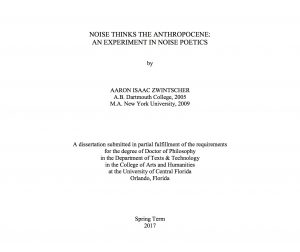
Aaron Zwintscher’s dissertation, Noise Thinks the Anthropocene: An Experiment in Noise Poetics, received the 2017-2018 Award for Outstanding Dissertation in the College of Arts and Humanities.
You can find the dissertation on STARS: http://stars.library.ucf.edu/etd/5504/
Abstract
This dissertation is a textual experiment in noise poetics. It is an experiment in that it results from indeterminate means, alternative grammar, and experimental thinking. The outcome was not predetermined. Noise poetics is the use of noise to explain, elucidate, and evoke (akin to other poetic forms) within the textual milieu in a manner that seeks to be less determinate and more improvisational than conventional writing. This text argues that noise poetics is a necessary form for addressing political inequality, coexistence with the (nonhuman) other, the ecological crisis, and sustainability because it approaches these issues as system of interconnected fragments and excesses and thus has the potential to reach or envision solutions in novel ways. The experiment draws quotations and fragments from a diverse collection of noise theory texts, arranged and assembled via indeterminate cut-up methods based on the work of several prominent artists and theorists (John Cage and William Burroughs among them). The experimental text (contained in full in Appendix B) was then edited and added to in order to craft the textual project into an argument for noise poetics that followed the juxtaposed lines of thought towards possible conclusions and practical applications. This project coincided with and was supplemented by bruit jouissance, a multimedia audiovisual noise project (contained and explicated in Appendix A). The two projects together are two applications of thoryvology (an articulation of noise theory created and presented within the text) and as complementary methods of viewing and understanding each other.